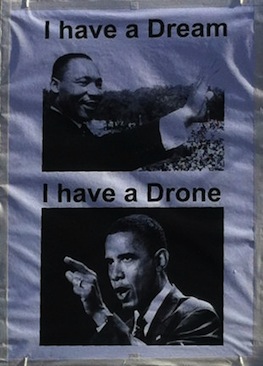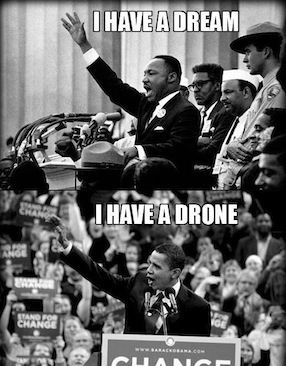Forget the adoring crowds. When Barack Obama spoke the other day at the Brandenburg Gate in Berlin, there was “a remarkable difference from the rock-star welcome” that greeted him in 2008 before his election as U.S. president and his acceptance of the 2009 Nobel Peace Prize. This time he was greeted by a justifiable meme setting forth what is likely to become his legacy.
+++
The contrast to the legacy of Dr. Martin Luther King Jr., winner of the 1964 Nobel Peace Prize, was painfully clear. As Norman Solomon, co-founder of RootsAction.org and founding director of the Institute for Public Accuracy, put it in an article earlier this year: “Obama has pursued policies that epitomize King’s grim warning in 1967: ‘When scientific power outruns moral power, we end up with guided missiles and misguided men.'” Even in his Nobel Prize acceptance speech, Obama “cast aspersions on [King’s] peace advocacy…”:
The president struck a respectful tone as he whetted the rhetorical knife before twisting. “I know there’s nothing weak — nothing passive — nothing naive — in the creed and lives of Gandhi and King,” he said, just before swiftly implying that those two advocates of nonviolent direct action were, in fact, passive and naive. “I face the world as it is, and cannot stand idle in the face of threats to the American people,” Obama added.
Moments later, he was straining to justify American warfare: past, present, future. “To say that force may sometimes be necessary is not a call to cynicism — it is a recognition of history; the imperfections of man and the limits of reason,” Obama said. “I raise this point, I begin with this point because in many countries there is a deep ambivalence about military action today, no matter what the cause. And at times, this is joined by a reflexive suspicion of America, the world’s sole military superpower.”
Then came the jingo pitch: “Whatever mistakes we have made, the plain fact is this: The United States of America has helped underwrite global security for more than six decades with the blood of our citizens and the strength of our arms.”
Crowing about the moral virtues of making war while accepting a peace prize might seem a bit odd, but Obama’s rhetoric was in sync with a key dictum from Orwell: “Who controls the past controls the future; who controls the present controls the past.”
Laboring to denigrate King’s anti-war past while boasting about Uncle Sam’s past (albeit acknowledging “mistakes,” a classic retrospective euphemism for carnage from the vantage point of perpetrators), Obama marshaled his oratory to foreshadow and justify the killing yet to come under his authority.
Looking back, particularly in the wake of the NSA surveillance scandal, how can anyone deny that this president, who claims to value transparency, has not made good on that claim? Obama made his intentions transparent from the very beginning.



It is nice to see a blogger on ArtsJournal who approaches culture from its larger social and philosophical perspectives. Naturally our cultural expression becomes isomorphic with larger social values. We blur our eyes and forget that dreams of justice were replaced by the drones of cybernetic death squads. We gradually accept that we live in a society of surveillance and control. Through our digital media, the whims, fears, and desires of society are mined and analyzed in massive detail. This mega-data is beginning to allow for social engineering of incomparable power. In the wired together, prosthetic world of global “cyberbia” the collective mind becomes a cybernetic ideal. I had a dream. I became a drone. More than a misguided man, I became a completely guided man.
Yes, we came long way away from our ideals, if we ever had any! Vietnam 3Mil., Iraq/Afhanistan X mil.!